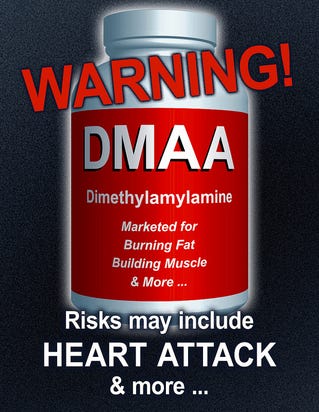FDA: Do not consume, make or sell DMAA-containing supplementsFDA: Do not consume, make or sell DMAA-containing supplements
Once-popular sports nutrition and weight-loss ingredient suffers another blow as the Food and Drug Administration issues strong warning against dietary supplements containing DMAA.

In a definitive warning sent out on April 12, the Food and Drug Administration urged consumers not to consume any workout boosters or fat-burning products containing DMAA, the once-popular ingredient that had been widely available on U.S. retail shelves. The agency said it is also using “all available tools at its disposal to ensure” that dietary supplements containing DMAA are no longer distributed and available for sale to consumers.
“We are very concerned,” Daniel Fabricant, the director of FDA’s division of dietary supplements programs, told The New York Times. “We think consumers should stay away from products containing DMAA.”
As of April 11, the FDA has received 86 reports of illnesses and deaths associated with DMAA-containing supplements, the agency reported.
The FDA’s stance goes against the long-held beliefs of USPlabs, which markets DMAA-containing products such as Jack3d and OxyELITE Pro and continues to argue that DMAA is safe. “USPlabs continues to believe that DMAA is legal, or otherwise they would not be selling it,” USPlab’s lawyer, Peter B. Hutt of Covington & Burlington, told The New York Times.
In response to an FDA warning letter stating that DMAA supplements are illegal and should not be sold, USPlabs submitted to the agency published studies that it says validate the safety of DMAA. “After reviewing the studies provided by USPlabs, FDA has found the information insufficient to defend the use of DMAA as an ingredient in dietary supplements,” FDA said in its April 12 warning.
For the Council for Responsible Nutrition, a leading trade association for the U.S. dietary supplement industry, the FDA’s word is the final say on the DMAA issue.
“It is clear from FDA’s Consumer Advisory that, having evaluated the evidence, FDA views DMAA as unsafe and warns that it presents unreasonable health risks to consumers,” CRN stated in a press release issued April 12. “FDA also stated that, in its view, products containing DMAA are illegal and should not be sold as dietary supplements. With this conclusion, CRN now calls on dietary supplement manufacturers to stop manufacturing these products and further advises consumers to stop using them.”
FDA’s warning to consumers is but the latest milestone in the rise and spectacular fall of the sports and weight-loss ingredient, DMAA. For a comprehensive overview, check out newhope360’s DMAA topic page.
About the Author
You May Also Like





